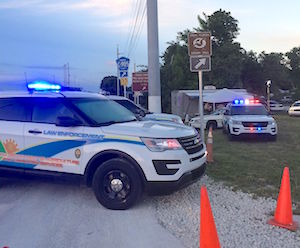Keys Visitors with Pets Should Be Aware of New World Screwworm in Lower Keys
LOWER KEYS -- In early October, the U.S. Department of Agriculture identified New World screwworm flies infesting a number of endangered Key deer, a subspecies of the white-tailed deer, in the Lower Florida Keys.
Screwworm-infested Key deer were found on Big Pine, No Name and Summerland keys, according to state officials.
Adult screwworm flies have been detected on nearby Big Torch, Middle Torch and Little Torch, Cudjoe, Sugarloaf and Ramrod keys and Munson Island - all in the Lower Keys.
Screwworms are fly larvae or maggots that can infest livestock and other warm-blooded mammals only through an open wound and feed on the animal's living flesh.
To prevent screwworm from spreading to other regions, the Florida Department of Agriculture and Consumer Services announced a Notice of General Animal Quarantine stretching from the southern border of Key Largo at mile marker (MM) 91 south to Key West. This area is much larger than the actual region where screwworms have been found.
There is no prohibition against bringing pets to the Keys. However, all visitors and residents traveling out of the Keys with animals must have them examined briefly at an Animal Health Check Zone, located at MM 106 off the Florida Keys Overseas Highway's northbound lanes in Key Largo.
The check station, open 24/7, is in place to ensure all animals are not infected with screwworms. So far over 16,000 animals have been examined without any evidence of infection.
Veterinarians caution residents and visitors to ensure that their pet is healthy and has no open wounds. It is best to keep pets indoors, especially on islands with confirmed screwworm presence.
"If you suspect your pet has screwworm, you shouldn't be fearful. It can be treated. Take it to a vet," said Florida Commissioner of Agriculture Adam Putnam.
Agriculture officials are fighting the Lower Keys infestation with measures including continued releases of millions of sterile flies (not genetically modified or engineered) to eliminate the screwworm fly population, as well as disease surveillance. Affected Key deer are being treated whenever possible.
Florida residents can get more information at
1-800-HELP-FLA (1-800-435-7352).
Non-Florida residents should call 850-410-3800.
To report a suspected case of screwworm in Key deer, call 305-470-6863, option 7.

Coming to the Keys with your pet? There is some important information you need to know.

All visitors and residents traveling out of the Keys with animals must have them examined briefly at an Animal Health Check Zone, located at MM 106 off the Florida Keys Overseas Highway's northbound lanes in Key Largo.
